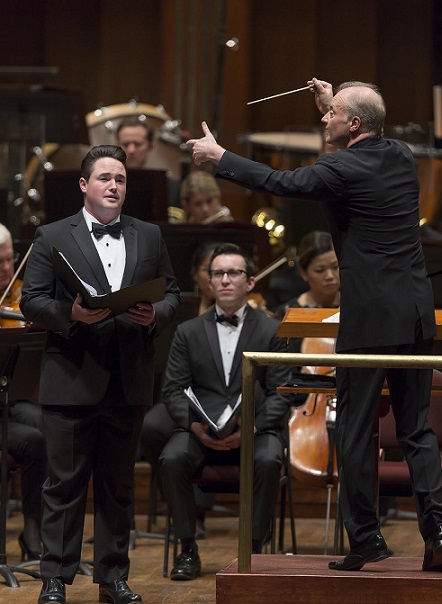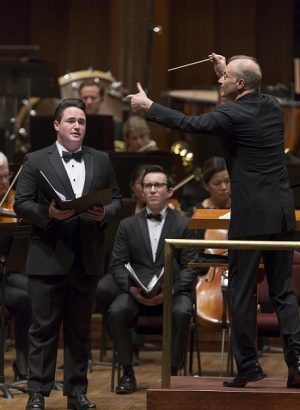 United States SHIFT Festival – Stravinsky, Balakirev, Rachmaninoff: Madison Leonard (soprano), Rexford Tester (tenor), Andrew Bogard (bass), National Symphony Orchestra / Gianandrea Noseda (conductor), The John F. Kennedy Center for the Performing Arts, Washington DC, 14.4.2018. (RP)
United States SHIFT Festival – Stravinsky, Balakirev, Rachmaninoff: Madison Leonard (soprano), Rexford Tester (tenor), Andrew Bogard (bass), National Symphony Orchestra / Gianandrea Noseda (conductor), The John F. Kennedy Center for the Performing Arts, Washington DC, 14.4.2018. (RP)

© Scott Suchman
Stravinsky – Pulcinella
Balakirev – Islamey (arr. Alfredo Casella)
Rachmaninoff – Five Études-tableaux (arr. Ottorino Respighi)
There have been many tributes to Dmitri Hvorostovsky, the great Russian baritone who died on 11 November 2017 at the age of 55, and there will be certainly be more. Few, however, will be as heartfelt and personal as that of the National Symphony Orchestra under the baton of its new music director, Gianandrea Noseda. Hvorostovsky had been scheduled to sing this concert, but that was not to be, and so it became his memorial.
The plan had been to perform Shostakovich’s Suite on Verses of Michelangelo Buonarroti, a symphonic-scale work that features Russian translations of sonnets by Michelangelo depicting an artist’s achievements, frustrations, loves and sense of destiny. In its place Noseda chose to focus on the spirit of the original endeavor and feature works by Russian composers with an Italian exposure. The result was a concert that was light in texture, dazzling in virtuosity and underlain with profound emotion.
Stravinsky’s Pulcinella is based on the eighteenth-century Italian composer Giovanni Battista Pergolesi’s opera buffa, La serva padrona. The complete score of the ballet with soprano, tenor and bass soloists that Noseda programmed is seldom performed, as opposed to the very popular orchestral suite that Stravinsky subsequently arranged. Pulcinella marked a shift for Stravinsky, for the modernist had discovered the past, and it is considered the first of his neoclassical works.
Stravinsky reworked Pergolesi’s opera, which included music from other composers but retained their melodies and figured bass lines. The result was witty, elegant music that Noseda and the NSO performed with panache. Interspersed between the overture and dances (one of which featured a wonderful trombone solo played by the NSO’s principal trombonist, Craig Mulcahy) are vocal delights.
The best known is ‘Se tu m’ami’, now deemed to be by the nineteenth-century Italian composer Alessandro Parisottii, which soprano Madison Leonard sang with coy charm and lustrous tone. Rexford Tester’s burnished lyric tenor captured the passion of an ardent lover, as well as his wariness of feminine wiles. Earnest and forthright in voice and demeanor, bass Andrew Bogard added a comic touch, perhaps unintentionally, but completely in keeping with the mock, high drama of commedia dell’arte.
Islamey, Balakirev’s tour de force for piano, was arranged for orchestra by Alfredo Casella, who obtained the Russian’s composer’s blessing on it during a visit to St. Petersburg in 1907. This work added another layer of personal connections to the program as Casella was born in Turin, where Noseda serves as music director of the Teatro Regio Torino. (There are rumors circulating as to his abrupt resignation on 19 April 2018.) Noseda captured the dazzling energy and the lyricism in a splendid account of this virtuosic showpiece, with the violins and trumpets vying for top prize in speed and accuracy.
The final work was Resphigi’s orchestration of Rachmaninoff’s Five Études-tableaux. Resphigi is credited with bringing Russian orchestral color to Italian music, having studied with the master, Rimsky-Korsakov. The dazzling brilliance was expected, but the humor in the fourth étude, ‘Little Red Riding Hood and the Wolf’, was unexpected. However, it was the transparency and mystery that Noseda captured in the first étude, ‘The Sea and the Seagulls’, that was particularly enchanting. The flute darting in and out of the orchestral textures and the hypnotic sounds of the waves was mesmerizing.
And so the tribute to Dmitri Hvorostovsky ended. My mind drifted to the words of Michelangelo that come near the end of the Shostakovich song cycle:
Here fate has sent me eternal sleep,
But I am not dead. Though buried in the earth,
I live in you, whose lamentation I hear,
Since friend is reflected in friend.
Surely they must have been reverberating in Noseda’s mind as he conducted this most special of concerts in memory of a superb artist, who was his friend as well as colleague.
Rick Perdian
